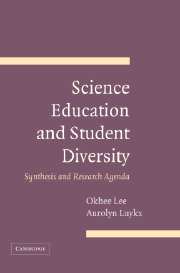Book contents
- Frontmatter
- Contents
- Foreword by Roland G. Tharp
- Acknowledgments
- Introduction
- SECTION I CONCEPTUAL GROUNDING AND POLICY CONTEXT
- SECTION II STUDENT LEARNING AND CLASSROOM PRACTICES
- 3 Students and Science Learning
- 4 Science Curriculum
- 5 Science Instruction
- 6 Science Assessment
- SECTION III CREATING EQUITABLE LEARNING ENVIRONMENTS
- SECTION IV CONCLUSIONS AND A RESEARCH AGENDA
- Appendix: Method for Research Synthesis
- References
- Index
6 - Science Assessment
Published online by Cambridge University Press: 04 December 2009
- Frontmatter
- Contents
- Foreword by Roland G. Tharp
- Acknowledgments
- Introduction
- SECTION I CONCEPTUAL GROUNDING AND POLICY CONTEXT
- SECTION II STUDENT LEARNING AND CLASSROOM PRACTICES
- 3 Students and Science Learning
- 4 Science Curriculum
- 5 Science Instruction
- 6 Science Assessment
- SECTION III CREATING EQUITABLE LEARNING ENVIRONMENTS
- SECTION IV CONCLUSIONS AND A RESEARCH AGENDA
- Appendix: Method for Research Synthesis
- References
- Index
Summary
There is an extensive body of literature on educational assessment in general, and also a large body of literature on assessment with nonmainstream students, including ELL students. However, research on science assessment with nonmainstream students (both large-scale and classroom assessment) is extremely limited (Lee, 1999a; Solano-Flores & Trumbull, 2003). As discussed earlier (see “Accountability as the Policy Context for Science Education” in Chapter 2), science is often not part of large-scale or statewide assessments, and even when it is tested, science usually does not count toward accountability measures. Additionally, because assessment of ELL students tends to concentrate on basic skills in literacy and numeracy, other subjects such as science tend to be ignored. Given that science is not part of accountability, research on science accommodations with ELL students is sparse. The exact number of states that assess science and/or include science in accountability measures is constantly changing as more states implement statewide science assessments. This trend is likely to intensify, as science will be part of the No Child Left Behind Act starting in 2007.
A critical issue concerning valid and equitable assessment in multicultural and multilingual settings is how to address cultural and linguistic influences on students' measured performance. A small number of studies about science assessment are divided into two categories: (a) science assessment with culturally diverse student groups and (b) science assessment with ELL students. Since these studies address a range of issues about science assessment, there are often only a few studies on a particular issue.
- Type
- Chapter
- Information
- Science Education and Student DiversitySynthesis and Research Agenda, pp. 92 - 100Publisher: Cambridge University PressPrint publication year: 2006



